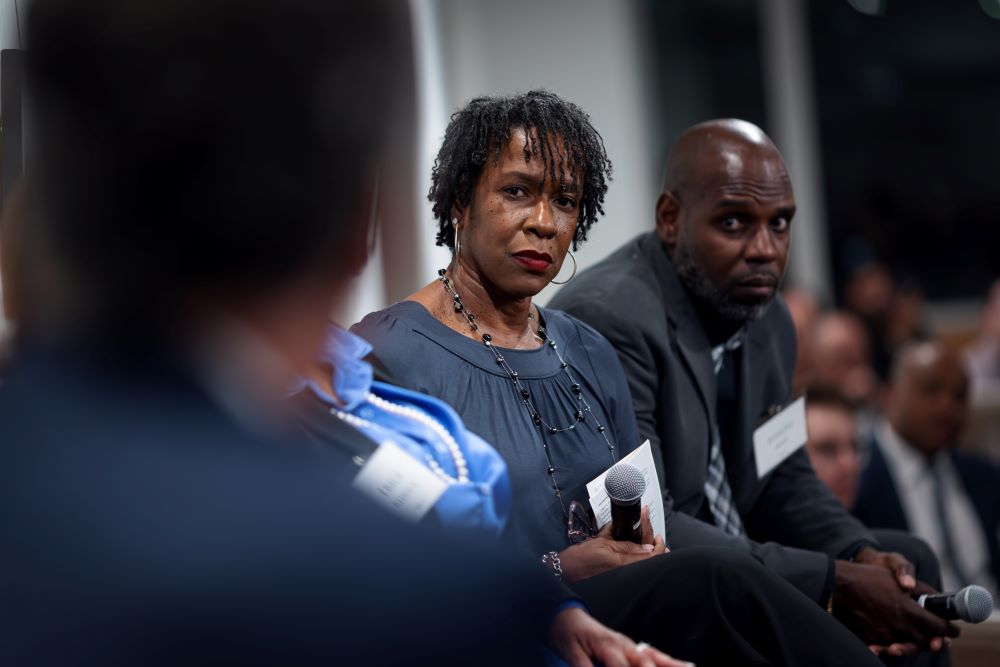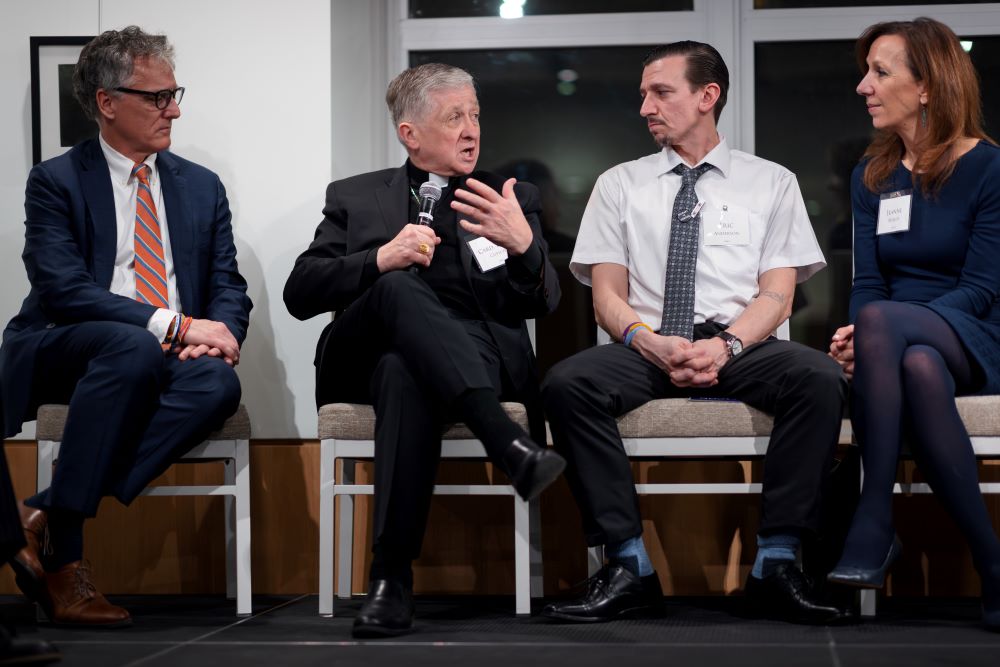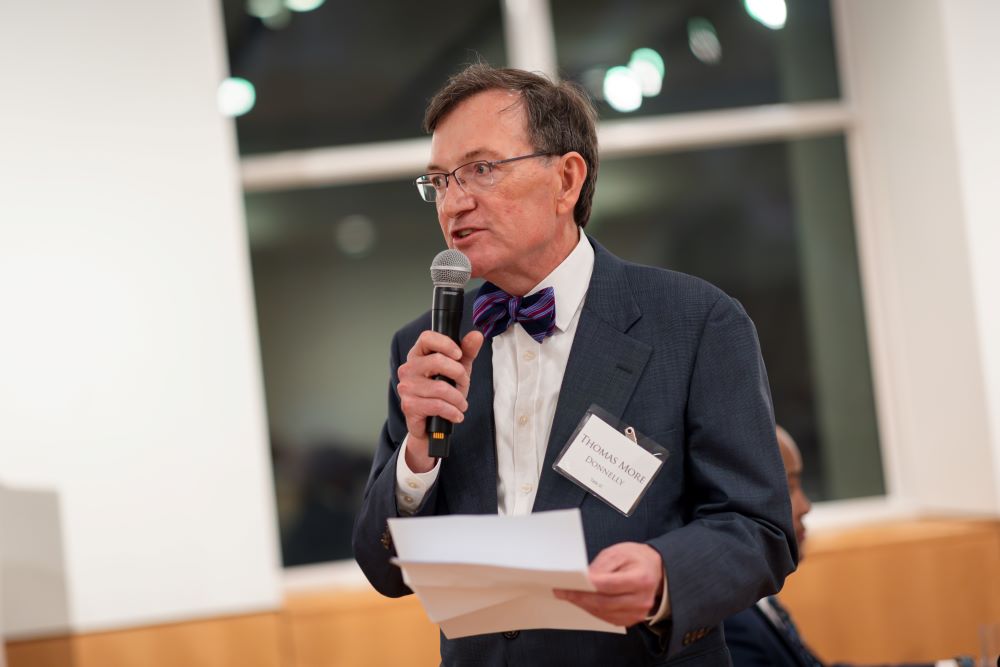
Lisa Daniels listens as Cook County Sheriff Tom Dart speaks at a Catholic Criminal Justice Reform Network event on Feb. 21 in Chicago. After her son was killed at 25 during a drug deal, Daniels founded the Darren B. Easterling Center for Restorative Practices in Chicago. (Courtesy of Lumen Christi/Travis Haughton)
It has been more than a decade since Lisa Daniels lost her youngest son, but she still cries when telling his story. Darren Easterling was 25 when he was murdered during a drug deal in a Chicago suburb, and while his body lay on the street, covered by a sheet, no one thought to try to inform his loved ones. His mother did not learn about his death until eight hours later, from a family friend.
"There were individuals who were doing their jobs on that day, and not a single one of them took a moment to decide that this young man had somebody that loved him," she said. "The summation of his 25 years was minimized to that single moment in his life, and he was continually judged by his single worst decision in his life. And not only was he judged by that, but I was, too."
After her son's death, Daniels became an advocate for restorative justice — which seeks to honor and heal every person affected by crime, even the perpetrators — and founded a center that fosters healing for young men with criminal backgrounds and their families.
She told her story during a Feb. 21 dialogue event sponsored by the Catholic Criminal Justice Reform Network, a project of the Lumen Christi Institute. It was one of a series of such conversations across the country aimed at fostering a "culture of encounter," as Pope Francis terms it, among those responsible for the criminal justice system and those impacted by it.
The nearly 200 attendees included prosecutors, defense attorneys, judges, corrections officials, legal scholars and law enforcement, as well as victims of crime, returning citizens and their families. Chicago Cardinal Blase Cupich was part of the panel and celebrated a Mass preceding the conversation.
"The focus is almost exclusively on punishment and controlling people who are incarcerated. … We don't have a healing system."
—Patrick Foley
Daniels' was just one of many stories participants told to illustrate the system's failure to acknowledge the humanity of crime victims, perpetrators, those who are or have been incarcerated, and their families.
Joseph "JoJo" Mapp served 26 years, five months and 26 days in prison, and each day was a dehumanizing punishment. "I was identified as less than a person and a person deserving of the worst treatment possible," he said.
At the maximum-security institution where Mapp was incarcerated, inmates were housed in their cells 21-23 hours a day and allowed to shower only twice a week. Sentenced as a teenager, Mapp struggled with suicide ideation.
One of his saddest days, he said, involved a birthday visit from his mother and two siblings, which required him to be strip-searched. Because his younger brother wore a sleeveless shirt, the prison officials refused to allow him entrance. And when his mother challenged the decision, she, too, was banned.
"Not only did I have to endure the isolation and loneliness of becoming a young man in an incarcerated setting, but I had to do it with the separation from my loved ones," he said.
Mapp now works as director of re-entry with Precious Blood Ministry of Reconciliation in Chicago, which serves young people and families impacted by violence, incarceration and structural inequity.

Chicago Cardinal Blase Cupich participated in a panel that included Cook County Sheriff Tom Dart (left); Eric Anderson, who was formerly incarcerated; and Jeanne Bishop, who became a restorative justice advocate after the murder of her sister, brother-in-law and their unborn child. (Courtesy of Lumen Christi/Travis Haughton)
Eric Anderson also works with Precious Blood's program, training incarcerated men in the practice of peace circles for conflict resolution and community building. At age 15, Anderson was sentenced to life without parole, but when the U.S. Supreme Court ruled that such sentences were unconstitutional for juvenile offenders, Anderson was resentenced and served 27 and a half years.
He saw his resentencing as a "miracle" and a second chance, but says the system offered him no way to "pay down his debt."
"What I found to be one of the most hurtful things about being in prison was the helplessness of being able to try to repair some of the harm you've caused," he said.
Anderson later realized the way to give back was to first heal himself and "every day to make the right decision when given the opportunity and try to give back."
Jeanne Bishop, whose sister and brother-in-law and their unborn child were murdered in 1990, described how her faith forced her to make peace with her sister's killer and led her to work for criminal justice reform. "It was the most healing thing I have ever done," she said.
Representing the criminal justice system on the panel were Cook County Sheriff Tom Dart and Judge Erica Reddick, presiding judge of the county's criminal division. Reddick said the most difficult part of her job is sentencing because she must balance the "pain, the anger, the anguish, the brokenness" of the victims with those same feelings of defendants' families.
Dart acknowledged that too often the criminal justice system loses its sense of humanity. "It makes people objects, it makes them not the people God created them to be. It makes it easy for people to be callous and thoughtless," he said.

Judge Thomas More Donnelly welcomed nearly 200 people to the community conversation sponsored by the Catholic Criminal Justice Reform Network. (Courtesy of Lumen Christi/Travis Haughton)
In his homily, Cupich said that the current broken system is a "deep wound that affects us all" and that reform of the system is everyone's responsibility, not just that of those who are involved in it. In his comments on the panel, he urged everyone to remember their interrelatedness.
"We can't ever reject somebody, where we take the worst thing they've done and say they aren't part of the human family anymore," Cupich said. "And we can't ignore the pain and suffering of those who have been injured. They're family too."
After the panel, the real work of the evening began, as each table held its own listening session among members of both "system responsible" and "system impacted" people. Although the conversations were confidential, reports at the end of the evening reflected powerful interactions and urgent calls for change. One table reported that all members had exchanged information and planned to stay in contact.
Judge Thomas More Donnelly, president of the Catholic Criminal Justice Reform Network, said he has seen evidence of changed hearts at this and previous dialogue events, held in Washington, D.C., Milwaukee and Madison, Wisconsin; San Diego and Detroit. One judge said he was going to start visiting inmates; others say they will look differently at people in their courts.
"Part of the problem with just seeing people in jumpsuits who are robbed of their voice is that you can't imagine them as people who are loved and love, as people with dreams and aspirations and talents. You just see them as their charge," Donnelly told NCR.
He said the dialogues also give people impacted by the system a chance to tell their stories to those representing the system that hurt them. In addition, the events highlight the importance of prison ministries and programs that help the formerly incarcerated to reenter society.
Advertisement
Patrick Foley, a former prosecutor who attended the Chicago event, said getting involved in restorative justice work has been humbling. When he began volunteering, he originally thought he was going to make an impact.
"I was very quickly disabused of this idea that it was me doing the transformation," he told NCR. "I've learned so much from being in the presence of people who are system-impacted. It breaks open your heart."
He now believes the system needs to be transformed, especially in how it treats people who are often suffering from trauma, generational poverty and/or mental illness. "The focus is almost exclusively on punishment and controlling people who are incarcerated. There is very little attention given to caring for the person," he said. "We don't have a healing system."
Future dialogues are scheduled for Memphis; statewide in California; and Covington, Kentucky.







